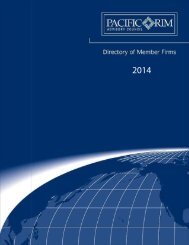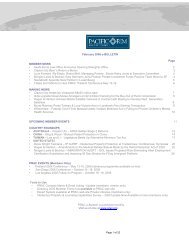A Guide to the Law of Securitisation in Australia - Clayton Utz
A Guide to the Law of Securitisation in Australia - Clayton Utz
A Guide to the Law of Securitisation in Australia - Clayton Utz
- No tags were found...
Create successful ePaper yourself
Turn your PDF publications into a flip-book with our unique Google optimized e-Paper software.
In segregated issues a similar result is aimed for by way <strong>of</strong>limit<strong>in</strong>g <strong>the</strong> powers <strong>of</strong> <strong>the</strong> corporate issuer <strong>in</strong> its constitution.However, such limitations are not as effective as <strong>the</strong> equivalentrestrictions <strong>in</strong> <strong>the</strong> trust deed <strong>of</strong> a trust issuer. This is becausepersons are entitled <strong>to</strong> assume that <strong>the</strong> company is act<strong>in</strong>g with<strong>in</strong>its powers unless <strong>the</strong>y knew or suspected that this is not <strong>the</strong> case(sections 128 and 129 <strong>of</strong> <strong>the</strong> Corporations Act).9.7.4 Tax liabilityAn unexpected liability for tax constitutes a risk for bothcorporate and trust issuers, as this may trigger <strong>the</strong> enforcemen<strong>to</strong>f <strong>the</strong> security <strong>in</strong> a securitisation program. This is because <strong>the</strong> taxauthorities will never be subject <strong>to</strong> <strong>the</strong> limited recourseprovisions, <strong>the</strong> transactions <strong>in</strong> a securitisation program <strong>in</strong>volvedeal<strong>in</strong>gs <strong>in</strong> large amounts <strong>of</strong> money and tax law is both highlycomplex and cont<strong>in</strong>ually chang<strong>in</strong>g.There is little risk that a liability <strong>of</strong> an issuer for tax could takepriority over a liability <strong>to</strong> <strong>in</strong>ves<strong>to</strong>rs or o<strong>the</strong>r secured credi<strong>to</strong>rs. TheFederal Commissioner <strong>of</strong> Taxation is an unsecured credi<strong>to</strong>r <strong>in</strong> aw<strong>in</strong>d<strong>in</strong>g-up <strong>of</strong> a company. It is possible for <strong>the</strong> Commissioner <strong>to</strong>effectively take priority over a float<strong>in</strong>g charge by issu<strong>in</strong>g a notice<strong>to</strong> a third party deb<strong>to</strong>r <strong>of</strong> a taxpayer <strong>to</strong> pay amounts due <strong>to</strong> <strong>the</strong>taxpayer directly <strong>to</strong> <strong>the</strong> Commissioner. However, au<strong>to</strong>maticcrystallisation clauses <strong>in</strong> float<strong>in</strong>g charges effectively preserve <strong>the</strong>priority <strong>of</strong> <strong>the</strong> chargee <strong>in</strong> such circumstances.Never<strong>the</strong>less, an unexpected tax liability <strong>of</strong> an issuer can cause<strong>the</strong> issuer <strong>to</strong> become <strong>in</strong>solvent and make it necessary <strong>to</strong> enforce<strong>the</strong> security held for <strong>the</strong> <strong>in</strong>ves<strong>to</strong>rs and o<strong>the</strong>r secured credi<strong>to</strong>rsand thus result <strong>in</strong> <strong>the</strong> early term<strong>in</strong>ation <strong>of</strong> a program. Where <strong>the</strong>issuer is a trust issuer, <strong>the</strong> tax liability is likely <strong>to</strong> be limited <strong>to</strong> <strong>the</strong>particular trust and will thus only trigger enforcement <strong>of</strong> <strong>the</strong>security over <strong>the</strong> assets <strong>of</strong> that trust. Where <strong>the</strong> issuer is asegregated corporate issuer, however, <strong>the</strong> tax liability is apersonal liability <strong>of</strong> <strong>the</strong> issuer and may require <strong>the</strong> enforcemen<strong>to</strong>f <strong>the</strong> security for all <strong>of</strong> <strong>the</strong> segregated series <strong>of</strong> securities issuedby <strong>the</strong> issuer.It is consequently important for all issuers, but <strong>in</strong> particularsegregated corporate issuers, that <strong>the</strong> taxation consequences <strong>of</strong><strong>the</strong> securitisation program have been carefully considered andthat <strong>the</strong> issuer will ei<strong>the</strong>r have no tax liability or that <strong>the</strong>re willbe sufficient funds <strong>to</strong> meet any tax liability. A legal op<strong>in</strong>ion as <strong>to</strong><strong>the</strong> liability <strong>to</strong> taxation <strong>of</strong> <strong>the</strong> issuer is <strong>in</strong>variably a requirement <strong>of</strong><strong>the</strong> rat<strong>in</strong>g agencies.9.7.5 Limited recourse <strong>of</strong> credi<strong>to</strong>rsF<strong>in</strong>ally, as discussed above, it is essential that all credi<strong>to</strong>rs <strong>of</strong> asegregated corporate issuer have agreed <strong>to</strong> limit <strong>the</strong> liability <strong>of</strong><strong>the</strong> issuer <strong>to</strong> <strong>the</strong>m <strong>to</strong> <strong>the</strong> amounts which <strong>the</strong>y are entitled <strong>to</strong>receive upon enforcement <strong>of</strong> <strong>the</strong> security for <strong>the</strong> relevant series.A failure <strong>to</strong> properly limit <strong>the</strong> liability <strong>of</strong> a credi<strong>to</strong>r will not result<strong>in</strong> <strong>the</strong> assets <strong>of</strong> o<strong>the</strong>r series be<strong>in</strong>g available <strong>to</strong> that credi<strong>to</strong>r. Itmay, however, require <strong>the</strong> enforcement <strong>of</strong> <strong>the</strong> security for thoseseries <strong>in</strong> order <strong>to</strong> protect <strong>the</strong> assets <strong>of</strong> those series from thatcredi<strong>to</strong>r.From <strong>the</strong> rat<strong>in</strong>g agencies po<strong>in</strong>t <strong>of</strong> view, limit<strong>in</strong>g <strong>the</strong> recourse <strong>of</strong>credi<strong>to</strong>rs <strong>of</strong> trustee issuers is not such a significant issue s<strong>in</strong>ce<strong>the</strong> <strong>in</strong>solvency <strong>of</strong> <strong>the</strong> trustee should not <strong>of</strong> itself result <strong>in</strong> <strong>the</strong>term<strong>in</strong>ation <strong>of</strong> a securitisation program. However, it is naturallya significant issue from <strong>the</strong> trustee’s perspective and <strong>the</strong> rights<strong>of</strong> credi<strong>to</strong>rs aga<strong>in</strong>st trust issuers are <strong>in</strong>variably limited asdescribed above.9.8 ConclusionTo date <strong>in</strong> <strong>Australia</strong>, <strong>the</strong>re has not been a failure <strong>of</strong> asecuritisation vehicle (although one or two have experienceddifficulties, none have been placed under <strong>the</strong> externaladm<strong>in</strong>istration <strong>of</strong> a receiver or a liquida<strong>to</strong>r). Never<strong>the</strong>less, <strong>the</strong>structur<strong>in</strong>g <strong>of</strong> securitisation programs is very much <strong>in</strong>fluenced by<strong>the</strong> <strong>in</strong>solvency provisions <strong>of</strong> <strong>the</strong> Corporations Act. A rat<strong>in</strong>g <strong>of</strong> asecuritised <strong>in</strong>strument, if it says noth<strong>in</strong>g else, <strong>in</strong>dicates that <strong>the</strong>securitised assets will be dealt with upon <strong>the</strong> <strong>in</strong>solvency <strong>of</strong> <strong>the</strong>issuer as <strong>in</strong>tended by <strong>the</strong> underly<strong>in</strong>g transaction documents.The next section <strong>of</strong> this publication considers a number <strong>of</strong> issuesthat arise when debt securities are issued by trustees.57






